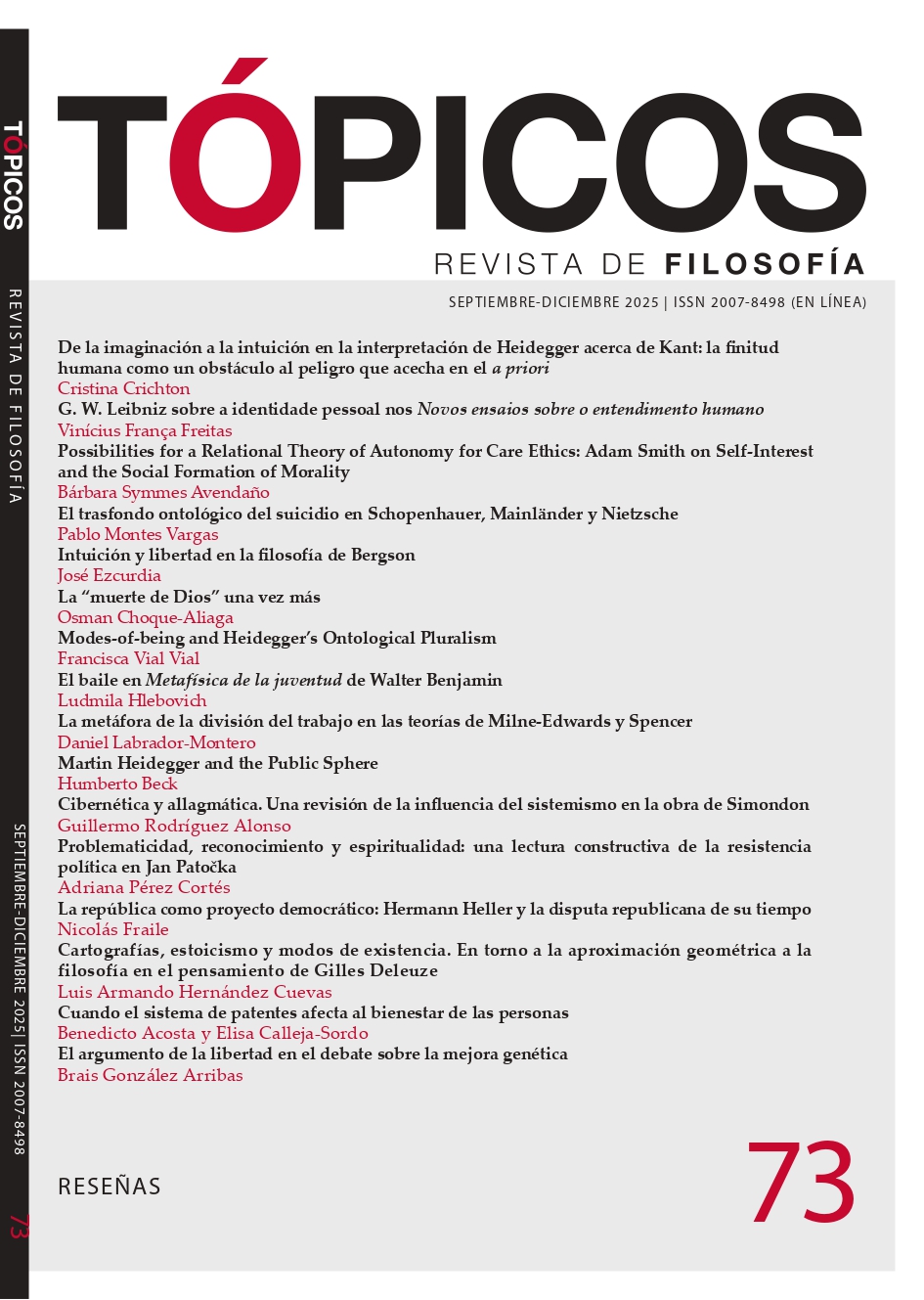Publiée 2025-08-22
Mots-clés
- Martin Heidegger,
- public sphere,
- humanism,
- truth,
- ontology
- intellectuals,
- politics,
- political theory,
- genuine thinking,
- Nazism,
- Being and Time,
- Letter on Humanism ...Plus
(c) Copyright Tópicos, Revista de Filosofía 2025

Ce travail est disponible sous licence Creative Commons Attribution - Pas d'Utilisation Commerciale - Pas de Modification 4.0 International.
Comment citer
Résumé
Martin Heidegger planteó un contraste fundamental entre el pensamiento auténtico y el ámbito de la opinión en la esfera pública. Este conflicto se expresa en la crítica de Ser y tiempo al fenómeno del “uno” como escenario inapropiado para el verdadero filosofar, y en la denuncia de la metafísica occidental en la Carta sobre el humanismo como basada en una tecnificación del pensamiento. Explorar los posibles vínculos entre estas ideas y la participación de Heidegger en el nacionalsocialismo puede refinar la discusión sobre la relación entre política y filosofía en el pensamiento de Heidegger. En concreto, puede conducir a la identificación de una noción implícita de lo político en su pensamiento.
Références
- Arendt, H. (1969). What Is Freedom? In H. Arendt, Between Past and Future: Eight Exercises in Political Thought (pp. 143-172). Viking Press.
- Arendt, H. (1971). The Life of the Mind. II. Harcourt.
- Beiner, R. (2018). Dangerous Minds: Nietzsche, Heidegger, and the Return of the Far Right. University of Pennsylvania Press. https://doi.org/10.9783/9780812295412
- Bourdieu, P. (1991). The Political Ontology of Martin Heidegger. P. Collier (trans.). Polity Press.
- Chartier, R. (1990). Les origines culturelles de la Révolution française. Éditions du Seuil.
- De Tocqueville, A. (2004). Democracy in America. A. Goldhammer (trans.). The Library of America.
- Farías, V. (1987). Heidegger et le nazisme. Verdier.
- Faye, E. (2009). Heidegger: The Introduction of Nazism into Philosophy. Yale University Press.
- Gordon, P. E. (2017). Prolegomena to any Future Destruction of Metaphysics: Heidegger and the Schwarze Hefte. In A. J. Mitchell & P. Trawny (eds.), Heidegger’s Black Notebooks: Responses to Anti-Semitism (pp. 136-151). Columbia University Press. https://doi.org/10.7312/mitc18044-012
- Habermas, J. (1987). The Undermining of Western Rationalism through the Critique of Metaphysics: Martin Heidegger. In J. Habermas, The Philosophical Discourse of Modernity: Twelve Lectures (pp. 131-160). F. G. Lawrence (trans.). MIT Press.
- Habermas, J. (1989). Work and Weltanschauung: The Heidegger Controversy from a German Perspective. J. McCumber (trans.). Critical Inquiry, 15(2), 431-456. https://doi.org/10.1086/448492
- Habermas, J. (1991). The Structural Transformation of the Bourgeois Public Sphere. T. Burger (trans.). MIT Press.
- Heidegger, M. (2000). Betr. die Notiz “Hanfstaengl contra Heidegger“ in der Münchner Süddeutschen Zeitung vom Mittwoch, den 14. Juni 1950. In M. Heidegger, Gesamtausgabe. I. Abteilung. Veröffentlichte Schriften 1910-1976. Band 16. Reden und Andere Zeugnisse eines Lebensweges (1910-1976) (pp. 452-453). Vittorio Klostermann.
- Heidegger, M. (2008a). [BT]. Being and Time. J. Macquarrie & E. Robinson (trans.). Harper Perennial.
- Heidegger, M. (2008b). Introduction: The Exposition of the Question of the Meaning of Being. In M. Heidegger, Basic Writings (pp. 41-87). J. Stambaugh & J. G. Gray (trans.). Harper San Francisco.
- Heidegger, M. (2008c). [LH]. Letter on Humanism. In M. Heidegger, Basic Writings (pp. 213-267). F. A. Capuzzi & J. G. Gray (trans.). Harper San Francisco.
- Heidegger, M. (2008d). On the Essence of Truth. In M. Heidegger, Basic Writings (pp. 111-138). J. Sallis & J. G. Gray (trans.). Harper San Francisco.
- Heidegger, M. (2014). Introduction to Metaphysics. G. Fried & R. Polt (trans.). Indiana University Press.
- Heidegger, M. (2016). Ponderings II-VI. Black Notebooks 1931-1938. R. Rojcewicz (trans.). Indiana University Press. https://doi.org/10.2979/11281.0
- Heidegger, M. (2017a). Ponderings VII-XI. Black Notebooks 1938-1939. R. Rojcewicz (trans.). Indiana University Press. https://doi.org/10.2979/11393.0
- Heidegger, M. (2017b). Ponderings XII-XV. Black Notebooks 1939-1941. R. Rojcewicz (trans.). Indiana University Press. https://doi.org/10.2979/11393.0
- Heidegger, M. (2024). Introduction to Philosophy. W. McNeill (trans.). Indiana University Press. https://doi.org/10.2307/jj.11288869
- Kant, I. (1996). An Answer to the Question: What is Enlightenment? In J. Schmidt (ed.), What is Enlightenment? Eighteenth-Century Answers and Twentieth-Century Questions (pp. 58-64). University of California Press. https://doi.org/10.1525/9780520916890-005
- Käufer, S. (2021). Publicness (Öffentlichkeit). In M. A. Wrathall (ed.), The Cambridge Heidegger Lexicon (pp. 615-616). Cambridge University Press. https://doi.org/10.1017/9780511843778.167
- Ott, H. (1993). Martin Heidegger: A Political Life. A. Blunden (trans.). Harper Collins.
- Pöggeler, O. (1993). Heidegger’s Political Self-Understanding. In R. Wolin (ed.), The Heidegger Controversy: A Critical Reader (pp. 198-244). S. Galt Crowell (trans.). MIT Press.
- Polt, R. (2017). Inception, Downfall, and the Broken World: Heidegger Above the Sea of Fog. In A. J. Mitchell & P. Trawny (eds.), Heidegger’s Black Notebooks: Responses to Anti-Semitism (pp. 74-97). Columbia University Press. https://doi.org/10.7312/mitc18044-008
- Rabinbach, A. (1997). In the Shadow of Catastrophe: German Intellectuals between Apocalypse and Enlightenment. University of California Press. https://doi.org/10.1525/9780520926257
- Rorty, R. (2000). On Heidegger’s Nazism. In R. Rorty, Philosophy and Social Hope (pp. 175-200). Penguin.
- Safranski, R. (1998). Martin Heidegger: Between Good and Evil. E. Osers (trans.). Harvard University Press.
- Sheehan, T. (1988, June 16). Heidegger and the Nazis. The New York Review of Books. https://www.nybooks.com/articles/1988/06/16/heidegger-and-the-nazis/
- Taylor, C. (2004). Modern Social Imaginaries. Duke University Press. https://doi.org/10.1215/9780822385806
- Trawny, P. (2015a). Freedom to Fail: Heidegger’s Anarchy. I. A. Moore & C. Turner (trans.). Polity.
- Trawny, P. (2015b). Heidegger and the Myth of a Jewish World Conspiracy. A. J. Mitchell (trans.). The University of Chicago Press. https://doi.org/10.7208/chicago/9780226303871.001.0001
- Villa, D. (1996). Arendt and Heidegger: The Fate of the Political. Princeton University Press. https://doi.org/10.1515/9781400821846
- Wolin, R. (1990). The Politics of Being: The Political Thought of Martin Heidegger. Columbia University Press. https://doi.org/10.7312/woli93972
- Wolin, R. (2022). Heidegger in Ruins: Between Philosophy and Ideology. Yale University Press. https://doi.org/10.2307/j.ctv36rk1cf





